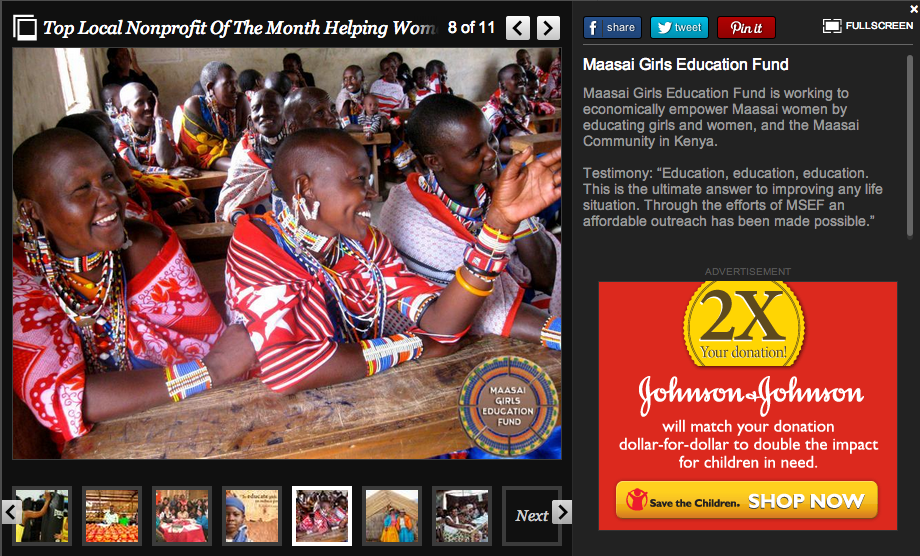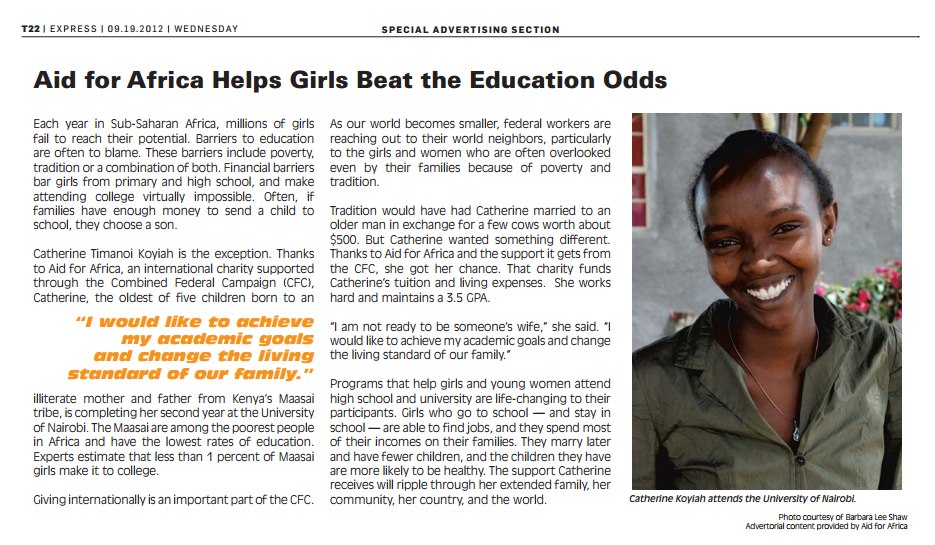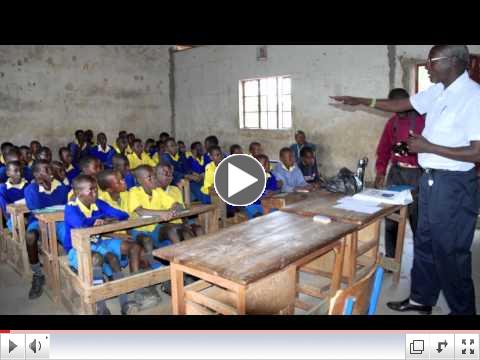05/31/16 by morpheus | Uncategorized | Comments Off on The Worth of Five Cows
It’s Blog Action Day 2011 and we’re all here for the main course, that is, the discourse on food. It may come as no surprise that nutrition, poverty, and international development are all intricately linked, and many poignant words will be written on this very topic today. You’ll probably read about gender and food distribution: when sustenance is scarce, girls are the last to receive their share. What may shock you is that beyond the unfair rations women are alotted in countries like Nepal and Malawi, the life of a girl is a measured commodity. In fact, her very existence is equated to food.
In the Maasai tribe of Kenya, girls are married off at pre-adolescent ages, some as young as twelve. The suitors are often twice as old – thus more likely to have HIV – and active polygamists. Fathers and husbands-to-be settle on the value, or dowry, for which the girl will be exchanged. She is never consulted or granted a voice in the matter. Now, can you guess how much this girl is worth in the eyes of her community?
Five cows.
Cows are lucrative animals in the Maasailands. They supply families with milk to sell and they produce calves to continue this cycle. The cow business isn’t all gain, however. This arid region barely contains the water needed for human beings to survive, let alone their livestock. If drought does not kill the cattle, natural causes will. The average lifespan of a cow is 22 years. So, while five cows may concievably give the Maasai family a source of food and income, the payoff is limited and meager in comparison to what is lost: the girl child. With the mounting threats a Maasai girl must face as she grows up, including domestic abuse, rape, and FGM, we can add to this list a very real chance of being sold. That is, until her value is deemed higher than five cows.
There’s a simple truth at play here: food scarcity is all tied up with economics. The Maasai are among the poorest of tribes in Kenya and selling daughters to the highest bidder is an attempt at escaping poverty. What is forgotten, or never even learned, is that an educated girl reinvests 90-percent of her salary into family. In one year alone, her contribution exceeds the monetary worth of five cows. She inspires other girls and their families to follow her example, enabling girls’ education to flourish and communities to thrive. Suddenly the girl child, once a bargaining chip, is a source of income. Some call it “the girl effect,” these benefits set in motion by a single person.
Whatever the name, it’s undeniable that girls deserve more than the portion they’re divvied. While pondering the many faces of food today, it is essential to remember how we are not just giving women less to eat or telling women that their bodies should be starved in order to reach a desirable image. In some parts of the world, we’re literally purchasing women for food-producing animals. The practice is sickening and degrading, but it is also, with your help, coming to an end.
Join Maasai Girls Education Fund (MGEF), where we enable girls to attend school, learn important life skills, and ultimately free themselves from outdated rites of passage, like child marriage. We’re empowering a new generation of Maasai women who are strong, independent and educated. And we invite you to clear your plate for just a moment to see how you can help. After all, isn’t a girl worth more than five cows?
05/31/16 by morpheus | Uncategorized | Comments Off on Help end poverty. Support community education!
Just recently, MGEF was selected by the GlobalGiving Foundation to participate in its Open Challenge, a fundraising opportunity for nonprofit organizations working around the world. In order to succeed in GlobalGiving’s Open Challenge, we must raise $4,000 from at least 50 donors by December 31st. If this threshold is met, MGEF will be given a permanent spot on GlobalGiving’s website, where we have the potential to benefit from corporate relationships, exposure to a new donor network, and access to dozens of online fundraising tools. But, we need your help spreading the word. Please share this opportunity with your friends and family, and if you’d like to contribute directly to our project page click here!
05/20/13 by morpheus | In the News | Comments Off on Top Nonprofit on the Huffington Post
The Huffington Post features Maasai Girls Education Fund along with nine other Washington, DC based nonprofits as a top organization helping women and girls. Click the sneakpeak image below to read the full article, and be sure to vote for MGEF by May 31st, 2013 (the poll is directly below the nonprofits’ photo slideshow in the article).

02/05/13 by morpheus | In the News | Comments Off on Reverse the Course Featured on News 12
Mary Grace Henry, Founder of Reverse the Course and Reverse the Course Foundation, was recently interviewed by News 12 in New York regarding her newest goal: to send 100 girls to school. She is in the running for a $10,000 grant from Kids Who Give. Cast your vote for Mary Grace here through February 5th, 2013!
Mary Grace currently sponsors seven MGEF students.
Read the full news article here.
01/10/13 by morpheus | In the News | Comments Off on MGEF in A&U Magazine
A&U Magazine, a publication that highlights “creative responses” to living with HIV/AIDS, features Cate Cameron and her NGO, Cameras4Change, in a January 10, 2013 article. Maasai Girls Education Fund (MGEF), Kajiado is mentioned as a collaborative partner during Cameron’s most recent trip to Kenya, during which she and her team conducted two workshops ( or with Heshima Kenya, a local nonprofit). Read entire story by clicking following link.
11/02/12 by morpheus | In the News | Comments Off on MGEF Founder on WPFW 89.3 FM Radio Show

On November 2nd, 2012, MGEF Founder Barbara Lee Shaw spoke on the WPFW 89.3 FM radio show “In Our Voices – Spirit In Action,” along with Marsha Wallace, Founder of Dining for Women (DFW), and Ursula Daniels, a member of DFW. The hour-long segment focused on DFW’s work and their mission to help marginalized women around the world. Barbara served as the voice of a grant recipient, explaining the impact DFW’s support has made in our work. To learn about DFW, please visit their website: diningforwomen.org.
09/19/12 by morpheus | In the News | Comments Off on Catherine Timanoi Koyiah Featured in Washington Post Express
MGEF student, Catherine Timanoi Koyiah, is featured along with her sponsor, Aid for Africa, in the September 19, 2012 issue of Washington DC’s Express. Click below to read the article:

08/01/12 by morpheus | In the News | Comments Off on Student Sponsor Featured in New Moon Girls and Lohud.com
Mary Grace, the 15-year-old businesswoman behind Reverse the Course and the sponsor of five MGEF students, was recently featured in New Moon Girls Magazine (July/Aug 2012 issue) and Lohud.com (July 2012). We are thrilled that Mary Grace is receiving due credit for her innovative approach to philanthropy, and we invite you to check out these articles about her work:
New Moon Girls
Lohud.com
07/26/12 by morpheus | In the News | Comments Off on MGEF Kajiado Receives EAAG Award
We have wonderful news to share with you. On July 26, 2012, our partner organization, Maasai Girls Education Fund – Kajiado (MGEF Kajiado), received the East Africa Grantmakers Association (EAAG) award for Community Philanthropy. Lucy Ntayia, Managing Director of MGEF Kajiado, and Kajiado board chair, Sophie Meeli, accepted the award in Entebbe, Uganda (see photo below).

During the awards gala, EAAG played excerpts from our videos, which outline the programs we deliver to the Maasai community in Kajiado County, Kenya. If you haven’t yet, we invite you to watch our newest video:

We are thankful to EAAG for recognizing our hard work, and we congratulate the other deserving awardees. Our appreciation also goes to you, our supporters, who enable us every single day to carry out our programs. This award belongs to all of you.
11/01/10 by morpheus | In the News | Comments Off on MGEF Featured in BeInkandescent
The November 2010 issue of BeInkandescent, an online magazine “for entrepreneurs by entrepreneurs,” features MGEF from the personal perspective of its president: Barbara Lee Shaw talks about the impact of her nonprofit the Maasai Girls Education Fund.
« Previous Page —
Next Page »





